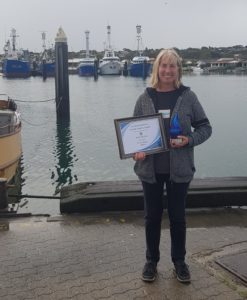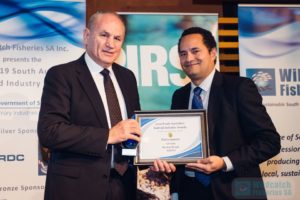
Kirsten Rough, researcher with Australian Southern Bluefin Tuna Industry Association (ASBTIA), has been awarded the SA Environmental Award for her commitment to evidence-based assessment of the risks and consequences of petroleum exploration and development in the Great Australian Bight (GAB).
The work Kirsten undertakes as part of her role with ASBTIA addresses a high priority for not only Southern Bluefin Tuna (SBT) industry, but also the wider seafood sector and has produced outcomes that have contributed to protecting the aquatic environment.
The Great Australian Bight is critical to the global population of SBT. All tuna are known to migrate thousands of kilometres to the area every year for at least the first five years of their life. Older individuals are also known to frequent the area to forage along the slope and throughout the Southern Ocean basin as well as transit the region on their way to the breeding grounds in the Indian Ocean.
An oil spill in the GAB is possibly the single most significant threat to the species. Other threats such as the unregulated fishing that occurred through the 1960’s and 1970’s were addressed by the introduction of catch limits in the 1980’s and further restrictions since then. These international quotas are applied on a global scale to all of the countries that fish for this type of Bluefin Tuna.
An oil spill and the chemicals used to disperse any discharge would inevitably have significant effects on the Southern Bluefin Tuna and consequently the many countries that share the resource. Port Lincoln and the South Australian economy stand to be particularly impacted as the local ranching operations and the large infrastructure and employment base that have developed rely on the wild stocks of Bluefin in the Bight. An oil spill in the Bight would undermine the international effort to rebuild the SBT population. Damage caused by oil exposure and seismic surveys is not confined to Bluefin tuna, research has shown impacts to a range of key species that are important in the wider ecosystem of the Great Australian Bight.
Kirsten says “It was a surprise, and a great feeling to have such wide recognition, and appreciation. But really I wouldn’t be doing my job if I wasn’t checking the finer details of every application that had the potential to impact on SBT through its migration and residency period in the Bight”
Kirsten’s nomination was supported by a broad range of GAB user groups including the other fishing sectors, as well as tourism and conservation groups.
